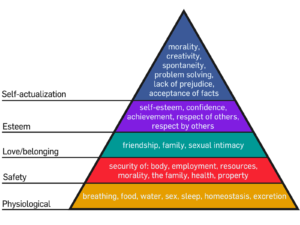Psychologists studying motivation examine the causes of our goal-directed behavior and the reasons why that behavior may vary in its intensity. Motivation is dynamic. We can be motivated by something in one moment, and motivated more, or less – and by something different – in the next moment.
There is a branch of behavioral science called motivational science, which puts together theories on what motivation is and how it works. Scientists study motivation by observing behavior, brain activity and physiology such as heart rate or changes to our pupil size.
There have been countless theories suggested about how motivation works. Here are three of the most well-known and respected theories about motivation:
- Maslow’s Need Hierarchy Theory – Abraham Maslow put forward a well–known theory based on the hierarchy of human needs. Maslow believed that once we have satisfied a need, it no longer motivates us, and can then only be motivated by some higher need that we have yet to satisfy.
- Herzberg’s Motivation Hygiene Theory – Frederick Herzberg built on Maslow’s work before him and proposes that both the presence and absence of satisfaction and dissatisfaction can be motivators.
- McClelland’s Need Theory – David McClelland proposed that we acquire different kinds of needs based on our education and environment, and that different people show different behaviors and respond to different motivators depending on which needs they have acquired.
You can take a deeper dive into these theories by checking out some of the links listed in A Deeper Dive below.



